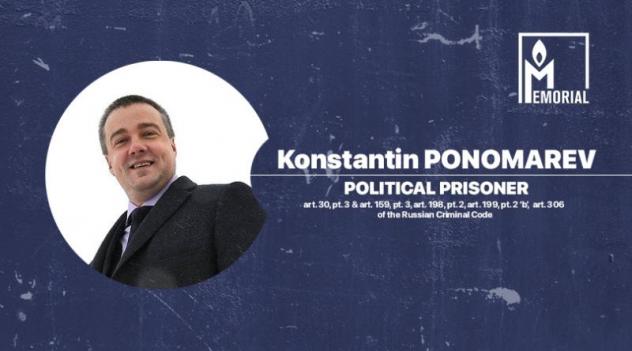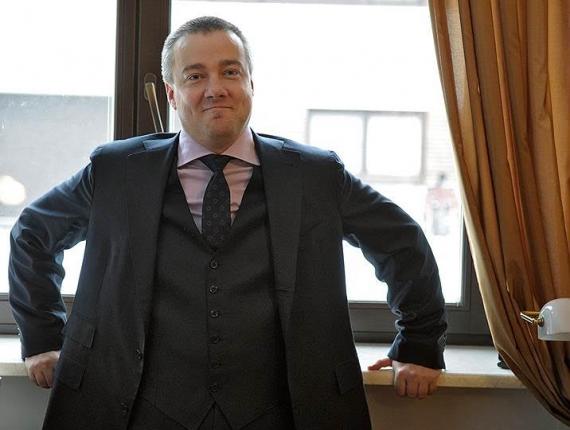Convicted businessman Konstantin Ponomarev is a political prisoner
He was found guilty of fraud and other crimes for attempting to collect payment for the use of his power generators during the energy blockade of Crimea
Memorial Human Rights Centre, in accordance with international guidelines, considers Konstantin Ponomarev a political prisoner. He has been imprisoned in violation of the right to fair trial and in order to demonstratively punish him for legitimate demands he made that electricity generators owned by him be returned and that payment be made for their use to supply electricity to Crimea after the peninsula’s annexation.
We demand an immediate review of the court decisions taken with regard to Konstantin Ponomarev and that rights of due process and fair trial be respected.
Who is Konstantin Ponomarev?
Konstantin Ponomarev is a major Russian entrepreneur who, among other things, was involved in the business of leasing diesel power plants. He had earlier become well-known in connection with a prolonged legal battle with IKEA which resulted in 2010 in him winning 25 billion roubles from IKEA for use of his generators.
Konstantin Ponomarev is on the Magnitsky List adopted by the European Parliament on 2 April 2014 concerning 32 individuals who, according to the European Parliament, were directly responsible for the death of the lawyer Sergei Magnitsky. Ponomarev was included in this list on the grounds that he received state protection in exchange for testimony he gave in the tax case against Magnitsky and Browder.
What are the charges against him?
In March 2014 Star-Energo, a limited liability company, transferred 71 diesel power generators that were in its keeping and owned by Ponomarev to be used in Crimea. Government bodies initially guaranteed to sign an agreement to lease or buy the generators, but then refused. By this means they placed the costs of supplying power to the peninsula on Ponomarev’s business. In 2016 Ponomarev won a lawsuit for the return of the generators against the state-owned company Kubanenergo, a subsidiary of Rosseti, a public joint stock company in which the state has a controlling share. Ponomarev then unsuccessfully attempted to collect payment for the use of his generators.
Kubanenergo ‘responded’ to Ponomarev by issuing a statement accusing him of defrauding Kubanenergo. The investigative authorities not only opened a criminal case on the basis of Kubanenergo’s statement but also initiated a review of earlier court decisions that had been in favour of Ponomarev in legal cases related to his business of leasing diesel power plants.
Ponomarev and the organization he headed were charged with tax evasion with regard to the 25 billion roubles he received from IKEA in 2010. He was accused of fraudulently reducing his tax base.
Ponomarev was also charged, together with his lawyer, of filing knowingly false allegations of defamation in court in 2014, and creating false evidence of defamation against himself (by bribing ‘witnesses’ and ‘defendants’). After the ‘evidence’ Ponomarev needed had been included in a court verdict, he used it in other lawsuits and legal proceedings as part of the litigation against IKEA and the tax authorities.
In 2019 and 2020 Konstantin Ponomarev was found guilty under the following articles of the Russian Criminal Code:
- Article 30, Part 3, of the Russian Criminal Code in conjunction with Article 159, Part 3: attempted large scale fraud;
- Article 199, Part 2, Paragraph ‘b’, of the Russian Criminal Code: large scale tax evasion by an organization;
- Article 198, Part 2, of the Russian Criminal Code: large-scale tax evasion by an individual;
- Article 306 of the Russian Criminal Code: making a knowingly false allegation about commission of a crime and organization of a knowingly false allegation.
Ponomarev was sentenced to ten years and two months in prison and fined 900,000 roubles. The court also ruled he should pay the Moscow tax authorities taxes and penalties of more than 12 billion roubles. Seventy-one diesel power generators belonging to Ponomarev, for the use of which Ponomarev did not receive a single rouble, were confiscated by the state as an instrument of crime.
Why Memorial considers Konstantin Ponomarev a political prisoner
Having studied the materials of the criminal case, we conclude that the prosecution of Ponomarev for fraud is clearly politically motivated. Ponomarev's lawful actions to protect his rights were absurdly and arbitrarily assessed by the authorities as fraudulent. Ponomarev has been the victim of a demonstrative punishment for attempting to obtain his property and money owed from a state-owned company. Ponomarev’s trial was a signal to all other businessmen who took part in supplying energy to Crimea that they should not even think of going to court to get their money back, or the worst consequences would follow.
Since the charge of fraud was very weak and far-fetched, charges of failing to pay taxes and knowingly making a false accusation were added. All the legal proceedings were conducted in violation of the right to fair trial. The fraud case was completely fabricated. The prosecution for tax evasion was conducted with gross violations of the law. Ponomarev was given a disproportionately harsh sentence once convicted on the charge of knowingly organizing a false allegation.
We do not approve of the organization of knowingly false allegations or failure to pay taxes (although it appears that Poromarev did not legally pay taxes). However, in the present case the real reasons for the criminal prosecution, which was conducted with gross violations of the law, was the political nature of the task of supplying energy to occupied and annexed Crimea. The state has unlawfully acted to ensure this energy supply, in violation of the constitutional principle of the protection of property rights, at the expense of private business.
As for Ponomarev’s inclusion in the Magnitsky List, as Ponomarev himself plausibly states, his testimony, given in the autumn of 2009, could not have provided the basis for Sergei Magnitsky being remanded in custody in 2008 and could not have played any significant role in his prosecution since it concerned events that took place long before those that formed the basis for the charges against Magnitsky.
In any case, the circumstances surrounding Ponomarev's inclusion in the Magnitsky List are unrelated to allegations of the use of violence and cannot affect our assessment of his imprisonment.
More information about this case is available on the website of Memorial Human Rights Centre.
Recognition of an individual as a political prisoner or as a victim of politically motivated prosecution does not imply Memorial Human Rights Centre agrees with, or approves of, their views, statements, or actions.
How to help
You can support all political prisoners by donating to the Fund to Support Political Prisoners of the Union of Solidarity with Political Prisoners via YooMoney 410011205892134: http://politzeky.ru/soyuz-solidarnosti/fond-pomoschi-politzaklyuchennym/49188.html
Поделиться:
- ВКонтакте
- РћРТвЂВВВВВВВВнокласснРСвЂВВВВВВВВРєРСвЂВВВВВВВВ
- Telegram


